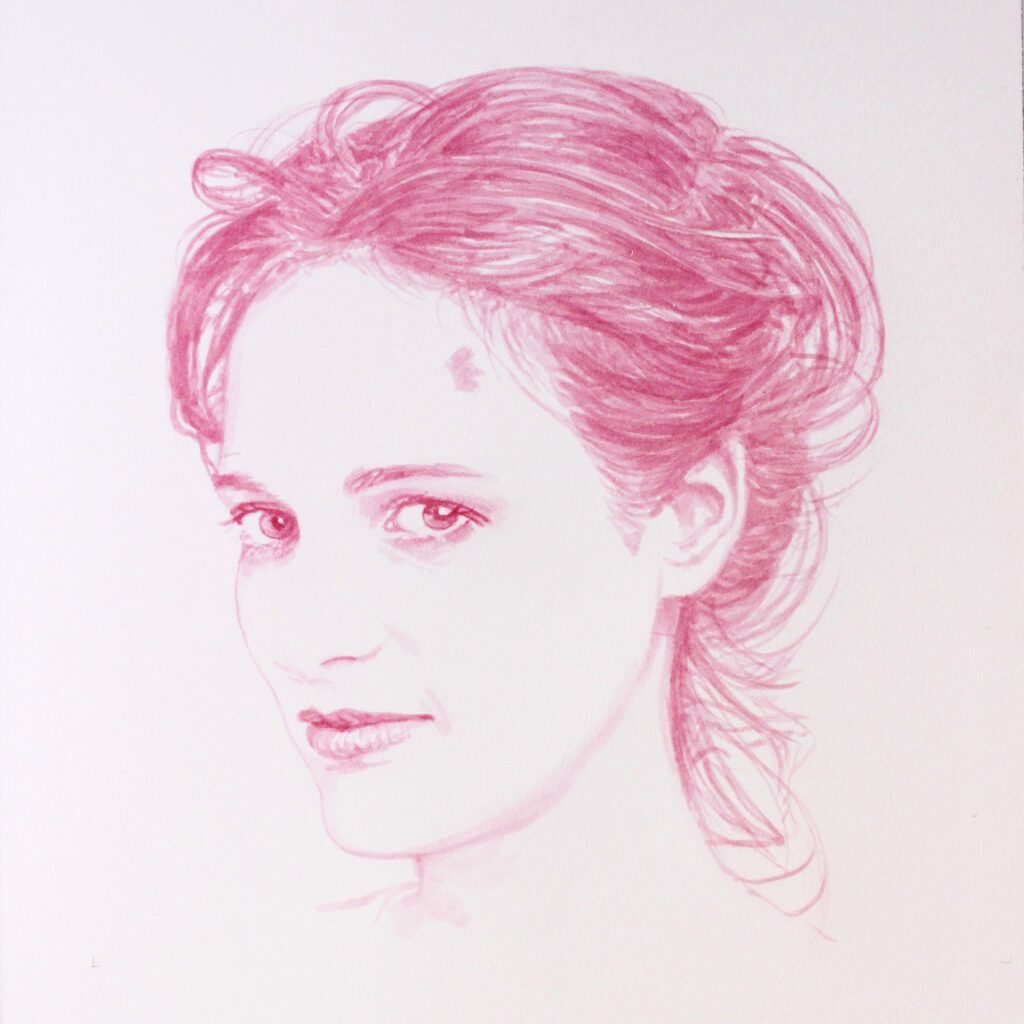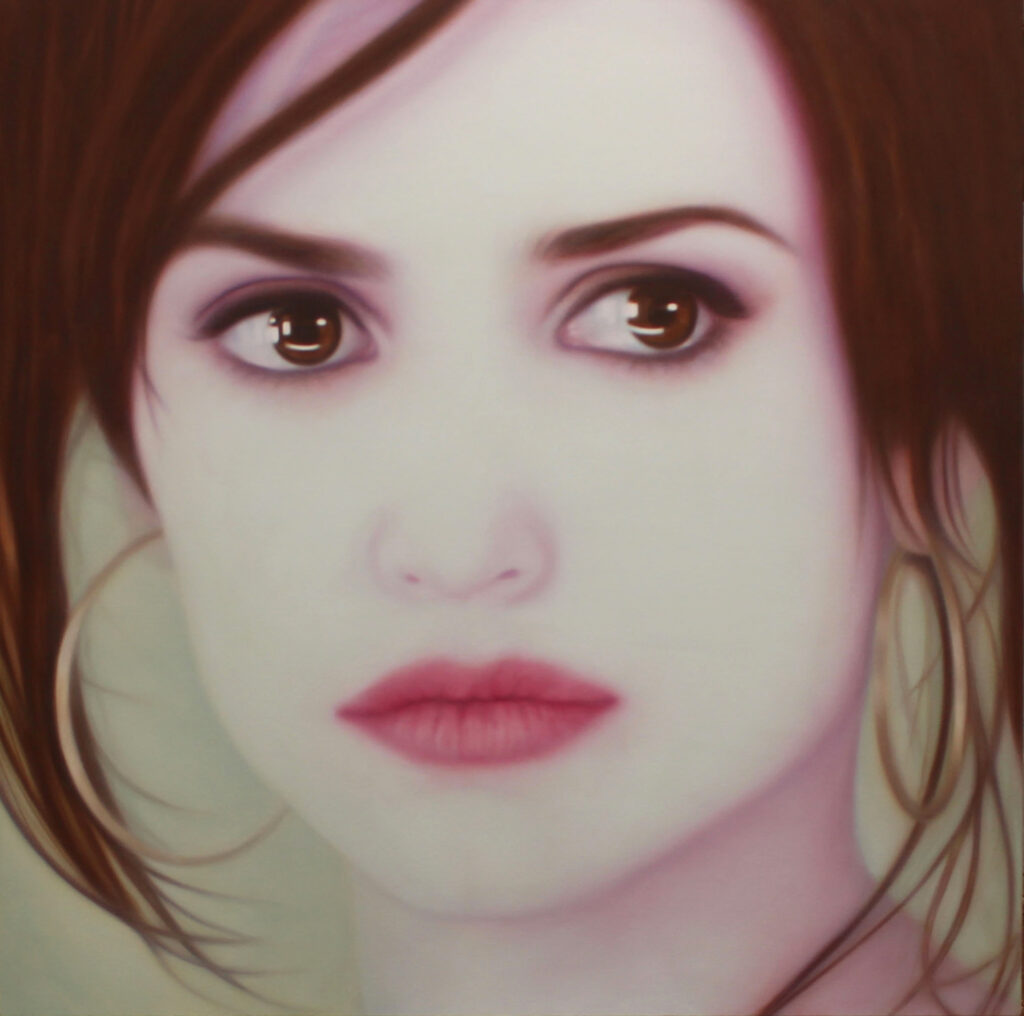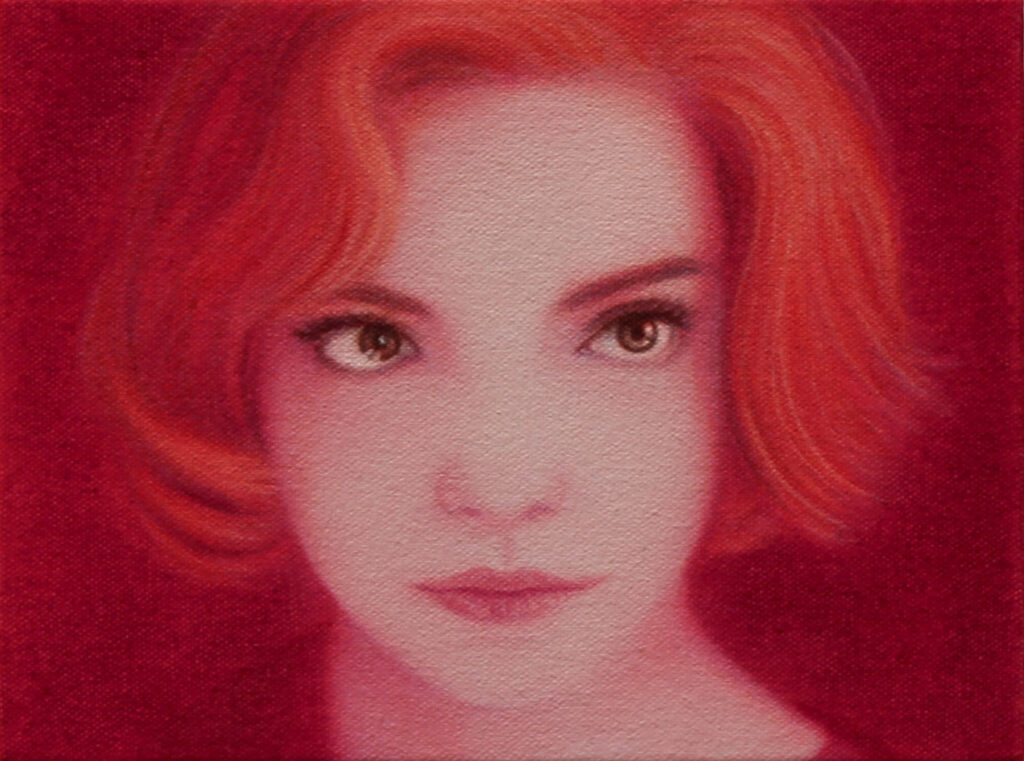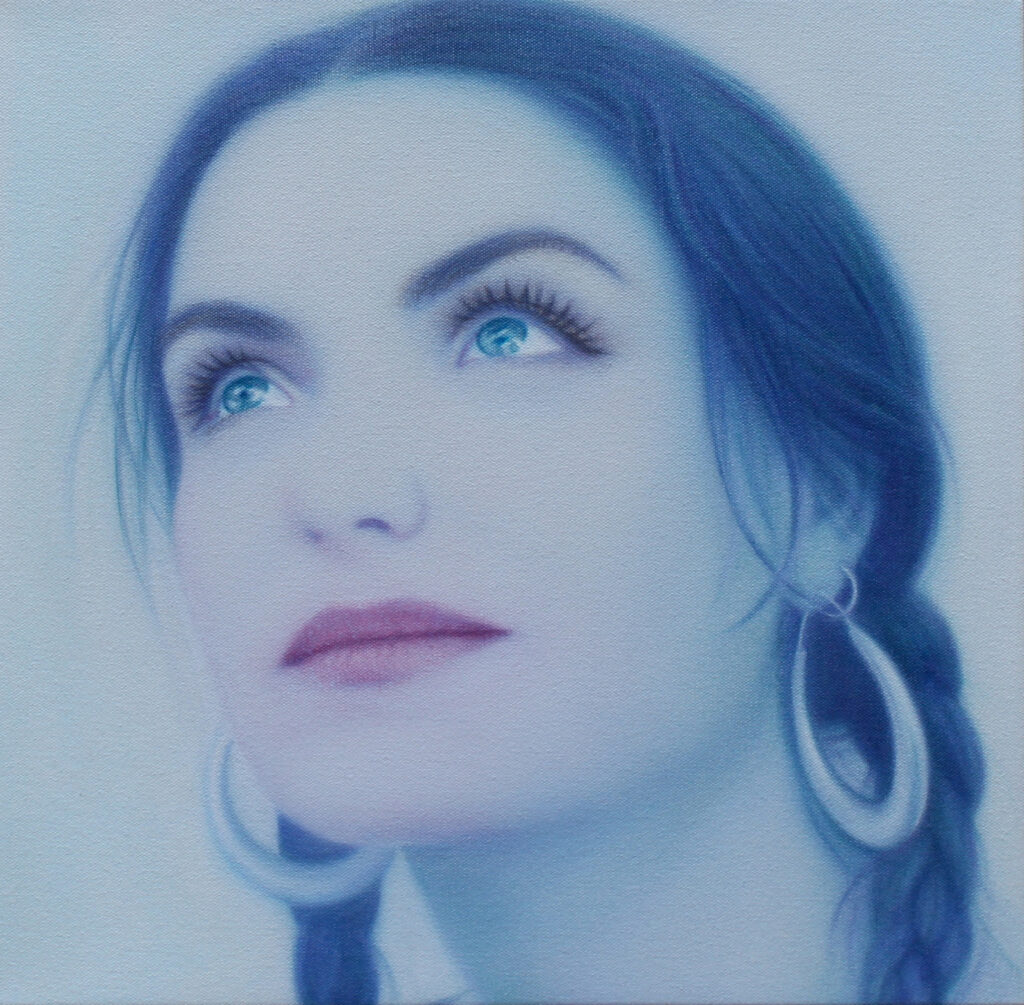(12-minutes read time)

In her series showcasing and spotlighting artists living and working in Valencia, this week Tina McCallan meets Josie McCoy, a British artist who explores the interfaces between TV and art, “low culture” and “high culture”, breaking them down…
Josie McCoy is a British artist, known for her gorgeous hyper-realistic style portraits of soap stars, film characters and singers. She relocated her life and studio from London around 2005, where she has exhibited widely and now has a studio in the Sporting Club Russafa. With our increasing reliance on Netflix, during the various lockdowns, Tina McCallan, a British artist and writer living in Valencia, wanted to find out more about her work and the relationship between art, film and TV…
Hi Josie, thanks for having me at your studio. First, I’d like to know what got you started on your artistic journey, how did you end up painting celebrities and soap opera characters?
“I have always struggled with ‘what’ to paint, in finding the right vehicle for my ideas. I was interested in expressing myself and my history, but I didn’t want to do self-portraiture. For my degree, I painted an image of Jodie Foster from The Little Girl Who Lives Down the Lane. I saw myself reflected in her character as we also lived in an isolated village. Then, while I was at Central Saint Martin’s Art School during my MA, I started making videos of friends in conversation trying to recreate the idea of a soap opera. A tutor said to me, “Why don’t you just paint directly from soap operas?”. A penny dropped and I made a series of close-up portraits based on EastEnders characters.
Why EastEnders?
“Well, I was already obsessed with EastEnders, At the time, I saw the characters more often than I saw my family, so I connected with them quite deeply!
In fact, I wasn’t allowed to watch soap operas when I was young, as my mum didn’t like them, so it was forbidden fruit! I loved the fact that it was a matriarchy, the women had all the power. Also, when I was younger, there were many changes in my life, so EastEnders became something constant and reassuring. In that era, watching the same TV programme was a kind of social glue and would spark conversations. I also love the fact that soap operas have cultural value, traditionally seen as a working-class pursuit whereas painting is seen as upper-class one. I like the idea of mixing the two together.”

Many artists work from photographs but you use a projector to draw the image on the canvas. Can you tell me a bit more about your process and how much that has changed with the advent of new technology?
“In the beginning, I sat in front of an old colour TV with a single lens reflex camera taking photos directly from the screen of the moments that appealed to me, usually the important close-up moment, when a character reveals something devastating. I would then get the film developed and project the negative on to the canvas and draw from that. In the early days there were lots of glitches and distortion in those images and so I included them in the early paintings. Nowadays, I find a digital image online or take a screenshot on my phone of the particular moment that I love and project it directly. Before, it used to take a week from choosing a moment to starting a painting – now, it’s almost immediate.”
Why do you choose the characters that you do? Have you ever painted a series relating to the fact that there are 24 frames in a filmic second?
“I generally choose strong female characters. I loved Penelope Cruz in Volver, a woman trying to protect her teenage daughter. I also think female characters from sci-fi films work well with the ideas behind my work, like the portrait of Rachael, the replicant, from Blade Runner. These paintings are about the fine line between reality and fiction. In the Time series I painted a series of images of Leeloo from The Fifth Element, where each painting is a blink of an eye later.
I’d love to paint all 24 images from one second of film, but I haven’t found the right moment yet! Lately, I am painting characters from Netflix series: Killing Eve, Fleabag, The Queen’s Gambit. Again, they work as a kind of social connector, as everyone is watching them. I also paint singers: the ones I used to love when I was growing up, they form a common cultural language that people from my generation, class and cultural landscape can relate to. Women like Debbie Harry, Poly Styrene, Siouxsie Sioux, Bjork.”
Lately, I am painting characters from Netflix series: Killing Eve, Fleabag, The Queen’s Gambit. Again, they work as a kind of social connector, as everyone is watching them.
– Josie McCoy
In the Penelope Cruz portrait, you almost feel you are drowning in her beauty, there is a cinematic quality to it. Why do you think we are so drawn to these faces?
“When we watch movies, these faces become part of our visual culture, they form a vernacular deeply embedded in our psyche. Roland Barthes sums it up when he talks about the actress Greta Garbo, saying that she belonged to a time when the audience of a movie theatre, on seeing her face, would be plunged into the deepest ecstasy, when one literally loses oneself in a human image, as one would in a love potion. I’m trying to create that effect by emphasising some parts and smoothing out other details, trying to capture the essence of the person. This almost surreal mask-like beauty allows us to project our deepest desires onto these characters using them as avatars to momentarily enter another reality.”
I like the marriage of technology and tradition, taking a split second from a screen and then painting it in a slow traditional way. What materials do you use?

“In terms of the painting, I’m really particular about the materials I use. I apply the layers of oil paint quite thinly using a particular solvent and build them up to get a glowing effect. I use Gamblin and Old Holland paints which are quite transparent. I’m trying to replicate the glow of the cinema or a TV screen. My earlier paintings were a lot more abstract, with more defined edges, but nowadays I’m really into smoothing out the edges, creating a soft-focus look that I get by dragging the paint with a dry brush.”
Which classical and contemporary artists have you been influenced by?
I’ve always been a huge fan of Vermeer and Velázquez. Contemporary artists I like (among many others) are: Kaye Donachie, Jenny Saville and Gerhard Richter.
You often show your work in galleries. How have you dealt with the pandemic?
“I got involved in the Artist’s Support Pledge, a wonderful initiative by Matthew Burrows to support artists through the pandemic. It’s based on an Instagram hashtag where you can post images of your work with a price limit of £200. After you have sold £1,000’ worth, you pledge to buy another artist’s work. I’ve sold quite a few sketches, watercolours and some small oil paintings and also got some commissions, and now I have a lovely art collection! I take commissions to paint real people and have done quite a few of those.”

What’s it like to be an artist in Valencia and what are your future plans?
“It’s a wonderful community, not as financially viable as London, but now we live in a global world so I can still connect to London galleries and artists. I love the barrio of Ruzafa, and the studio. We are in the Lonely Planet, so we do get a lot of visitors at the weekend. I also give painting classes, so that’s a great way to connect with people. I have a solo show here, in the Sporting Club Russafa in November but before then, in July, I’m taking part in Dirty Pink, a group show of 14 female artists, which I’m really excited about!”
How does one contact you about a commission?
“Studio visits are actively encouraged! You can follow me on Instagram @josiemccoyart or email me directly to join my mailing list or for any enquiries: josiemccoyart@gmail.com
Thanks for talking to The Valencian, Josie – it’s been a pleasure to find out more about your work…
Links
Website: https://www.josiemccoy.co.uk/about/
Instagram: https://www.instagram.com/josiemccoyart/ @josiemccoyart
Facebook: https://www.facebook.com/josiemccoyart
https://www.instagram.com/artistsupportpledge/
Tina McCallan is a British artist and writer living and working in Valencia

